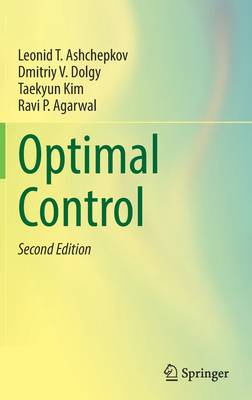
- Retrait gratuit dans votre magasin Club
- 7.000.000 titres dans notre catalogue
- Payer en toute sécurité
- Toujours un magasin près de chez vous
- Retrait gratuit dans votre magasin Club
- 7.000.0000 titres dans notre catalogue
- Payer en toute sécurité
- Toujours un magasin près de chez vous
Optimal Control
Leonid T Ashchepkov, Dmitriy V Dolgy, Taekyun Kim, Ravi P Agarwal
Livre relié | Anglais
79,45 €
+ 158 points
Description
This textbook, now in its second edition, results from lectures, practical problems, and workshops on Optimal Control, given by the authors at Irkutsk State University, Far Eastern Federal University (both in Vladivostok, Russia), and Kwangwoon University (Seoul, South Korea).
In this work, the authors cover the theory of linear and nonlinear systems, touching on the basic problem of establishing the necessary and sufficient conditions of optimal processes. Readers will find two new chapters, with results of potential interest to researchers with a focus on the theory of optimal control, as well as to those interested in applications in Engineering and related sciences. In addition, several improvements have been made through the text.
This book is structured in three parts. Part I starts with a gentle introduction to the basic concepts in Optimal Control. In Part II, the theory of linear control systems is constructed on thebasis of the separation theorem and the concept of a reachability set. The authors prove the closure of reachability set in the class of piecewise continuous controls and touch on the problems of controllability, observability, identification, performance, and terminal control. Part III, in its turn, is devoted to nonlinear control systems. Using the method of variations and the Lagrange multipliers rule of nonlinear problems, the authors prove the Pontryagin maximum principle for problems with mobile ends of trajectories.
Problem sets at the end of chapters and a list of additional tasks, provided in the appendix, are offered for students seeking to master the subject. The exercises have been chosen not only as a way to assimilate the theory but also as to induct the application of such knowledge in more advanced problems.
In this work, the authors cover the theory of linear and nonlinear systems, touching on the basic problem of establishing the necessary and sufficient conditions of optimal processes. Readers will find two new chapters, with results of potential interest to researchers with a focus on the theory of optimal control, as well as to those interested in applications in Engineering and related sciences. In addition, several improvements have been made through the text.
This book is structured in three parts. Part I starts with a gentle introduction to the basic concepts in Optimal Control. In Part II, the theory of linear control systems is constructed on thebasis of the separation theorem and the concept of a reachability set. The authors prove the closure of reachability set in the class of piecewise continuous controls and touch on the problems of controllability, observability, identification, performance, and terminal control. Part III, in its turn, is devoted to nonlinear control systems. Using the method of variations and the Lagrange multipliers rule of nonlinear problems, the authors prove the Pontryagin maximum principle for problems with mobile ends of trajectories.
Problem sets at the end of chapters and a list of additional tasks, provided in the appendix, are offered for students seeking to master the subject. The exercises have been chosen not only as a way to assimilate the theory but also as to induct the application of such knowledge in more advanced problems.
Spécifications
Parties prenantes
- Auteur(s) :
- Editeur:
Contenu
- Nombre de pages :
- 251
- Langue:
- Anglais
Caractéristiques
- EAN:
- 9783030910280
- Date de parution :
- 13-01-22
- Format:
- Livre relié
- Format numérique:
- Genaaid
- Dimensions :
- 156 mm x 234 mm
- Poids :
- 557 g

Les avis
Nous publions uniquement les avis qui respectent les conditions requises. Consultez nos conditions pour les avis.






